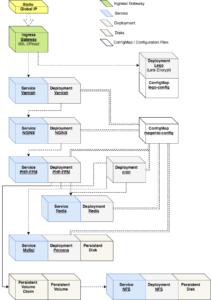
Are you looking for a scalable Magento cloud hosting solution? Here is a diagram on how a scalable Magento Kubernetes environment on Google Cloud looks like. Bonus: Free SSL!
- Static IP. A static IP address is a number (in the form of a dotted quad) that is assigned to a server by an Internet service provider (ISP) to be its permanent address on the Internet. Configure a new static IP on GCP.
- Kubernetes. Open-source system for automating deployment, scaling, and management of containerized applications.
- Ingress Docker container. Ingress is an extension to the Kubernetes API that encapsulates a collection of rules for routing external traffic to Kubernetes endpoints:
- Kube-Lego Docker container (With using GKE/GCE ingress controller you hand off the HTTP routing to GCE). Configure Kubernetes Ingress Resource with a Static IP on GKE.
- Let’s Encrypt SSL. Free, automated, and open certificate authority brought to you by the non-profit Internet Security Research Group (ISRG).
- Varnish Docker container. Varnish is an HTTP accelerator designed for content-heavy dynamic web sites as well as heavily consumed APIs. Varnish Cache is really, really fast. It typically speeds up delivery depending on the architecture.
- Redis Docker container. In-memory database open-source software project sponsored by Redis Labs[4]. It is networked, in-memory, and stores keys with optional durability.
- NGINX Docker container. Accelerates content and application delivery, improves security, facilitates availability and scalability for the busiest web sites on the Internet.
- PHP-FPM Docker container. FastCGI Process Manager) is an alternative PHP FastCGI implementation with some additional features useful for sites of any size, especially busier sites.
- Cron Docker container. The software utility Cron is a time-based job scheduler in Unix-like computer operating systems. People who set up and maintain software environments use cron to schedule jobs (commands or shell scripts) to run periodically at fixed times, dates, or intervals. It typically automates system maintenance or administration.
- MySQL Percona Docker container. Percona Server for MySQL 5.7 is a drop-in compatible replacement, high performance alternative forMySQL databases.
- PersistentVolume. A piece of networked storage in the cluster that has been provisioned by an administrator. It is a resource in the cluster just like a node is a cluster resource. PVs are volume plugins like Volumes, but have a lifecycle independent of any individual pod that uses the PV. This API object captures the details of the implementation of the storage, be that NFS, iSCSI, or a cloud-provider-specific storage system.
- File Server. A file server, also called a storage filer, provides a way for applications to read and update files that are shared across machines. Typically, a file server uses a protocol that enables client machines to mount a filesystem and access the files as if they were hosted locally. The most common protocols for exporting file shares are Network File System (NFS) for Linux and the Common Internet File System (CIFS) for Windows.
- Ingress Docker container. Ingress is an extension to the Kubernetes API that encapsulates a collection of rules for routing external traffic to Kubernetes endpoints:
Step By Step Guide for Deploying Magento 2 Bitnami Charts in Kubernetes on Google Cloud.
Want to skip the hassle? We offer Magento Cloud Hosting.
Email us at hello@buildateam.io for an advice or a quote. Also feel free to check out Managed Magento Optimized Google Cloud Hosting
Authors:
Kirill Morozov, Alexey Eremenko.

